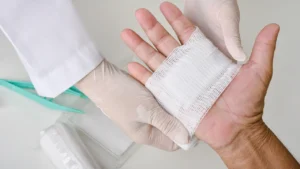Non-healing wounds can be incredibly frustrating and debilitating, often leading to persistent pain and a decreased quality of life. If you’ve been struggling with a wound that simply won’t heal, you’re not alone. The good news is that orthopedic treatment for non-healing wounds offers a solution that can help accelerate the healing process, alleviate discomfort, and reduce complications. This article will explore how orthopedic care can address chronic wounds, improve recovery time, and give you the relief you need.
Understanding Non-Healing Wounds
Non-healing wounds, often referred to as chronic wounds, are wounds that do not heal in a predictable time frame or heal slowly. These types of wounds can be caused by various factors such as poor circulation, underlying medical conditions like diabetes, pressure ulcers, or venous leg ulcers. While non-healing wounds may improve with basic care, orthopedic treatment for non-healing wounds is often necessary to address the root causes of the wound, such as joint misalignment or bone health issues, which can prevent proper healing. Early recognition of these wounds is key to preventing further complications and ensuring the best outcomes.
The Importance of Timely Wound Care
Delaying treatment for non-healing wounds can lead to severe complications, including infection, tissue damage, and even amputation in extreme cases. The longer a wound remains open and untreated, the more difficult it becomes to heal. This is why seeking orthopedic treatment for non-healing wounds as soon as possible is crucial. Orthopedic specialists are trained to identify the factors that impede healing and can help with interventions such as surgery, physical therapy, or specialized wound care techniques to promote faster recovery. If your wound isn’t improving or is causing you constant discomfort, it may be time to consult with an orthopedic doctor.
How Orthopedic Treatment Aids in Healing Non-Healing Wounds
Orthopedic treatment for non-healing wounds works by addressing the mechanical or biological factors that hinder the healing process. Orthopedic specialists use a combination of advanced techniques to promote recovery. For example:
- Orthopedic Surgery: In some cases, surgery may be necessary to remove damaged tissue, realign bones, or repair joints that are preventing proper healing.
- Physical Therapy: By improving mobility and circulation, physical therapy can enhance blood flow to the affected area, accelerating the healing process.
- Wound Care Techniques: Orthopedic treatment also involves specialized wound care, such as negative pressure wound therapy (NPWT) or advanced dressings, that help manage the wound and keep it clean, reducing the risk of infection and promoting tissue regeneration.
By targeting the underlying causes and offering advanced treatments, orthopedic treatment for non-healing wounds can significantly improve your chances of recovery.
Benefits of Orthopedic Treatment for Non-Healing Wounds
The benefits of orthopedic treatment for non-healing wounds are far-reaching. One of the most immediate benefits is the acceleration of healing time. When treated by an orthopedic specialist, wounds can begin to heal more quickly, reducing the risk of infection and the need for prolonged care.
Orthopedic care also helps reduce the pain and discomfort associated with non-healing wounds. By addressing the root causes—whether it’s poor circulation, joint misalignment, or an infection—patients often experience less pain, which can make a significant difference in their overall well-being.
In the long term, orthopedic treatment for non-healing wounds can lead to better mobility, fewer complications, and an overall improved quality of life. By focusing on the holistic healing process, orthopedic specialists can ensure that wounds are not just treated, but that the body is restored to its optimal functioning.
When to Consult an Orthopedic Specialist
If you’re dealing with a non-healing wound, knowing when to seek professional help is essential. If a wound is not improving after several weeks of basic care, or if it becomes infected or extremely painful, it’s time to consider orthopedic treatment for non-healing wounds. Consulting with an orthopedic specialist will help identify whether there is an underlying issue, such as joint misalignment or circulation problems, that is preventing the wound from healing.
During an orthopedic consultation, expect a thorough assessment of the wound and your overall health. The specialist will likely conduct diagnostic tests such as imaging to determine if there are any bone or joint issues contributing to the problem. Based on the findings, a personalized treatment plan will be created to address the root cause and help the wound heal faster.
Preventing Non-Healing Wounds in the Future
While orthopedic treatment for non-healing wounds can offer a solution for chronic wounds, prevention is always better than cure. Making a few lifestyle changes can significantly reduce your risk of developing non-healing wounds. For example:
- Managing Diabetes: Properly managing blood sugar levels can prevent diabetic ulcers, one of the most common causes of non-healing wounds.
- Staying Active: Regular exercise can improve circulation, which is vital for wound healing.
- Good Skin Care: Keeping the skin moisturized and free from pressure can help prevent pressure ulcers and other types of wounds.
In addition to these steps, regular check-ups with your healthcare provider can help catch potential issues before they become serious. If you do develop a non-healing wound, prompt consultation with an orthopedic specialist can prevent complications and improve your healing outcome.
Takeaway
Non-healing wounds are not just a minor inconvenience—they can severely impact your life if left untreated. Fortunately, orthopedic treatment for non-healing wounds offers a comprehensive solution that addresses the underlying causes of chronic wounds and helps accelerate the healing process. From advanced wound care to surgical interventions and physical therapy, orthopedic specialists have the tools and expertise to promote faster recovery and improve overall quality of life. If you’re struggling with a non-healing wound, don’t wait—consult with an orthopedic specialist today and take the first step towards a healthier, pain-free future.






